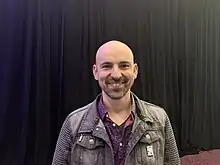Federico Ardila
Federico Ardila (born 1977) is a Colombian mathematician and DJ who researches combinatorics and specializes in matroid theory. Ardila graduated from MIT with a B.Sc. in Mathematics in 1998 and obtained a Ph.D in 2003 under the supervision of Richard P. Stanley in the same institution.[2] Ardila is currently a professor at the San Francisco State University and additionally holds an adjunct position at the University of Los Andes in Colombia.[3]
Federico Ardila | |
|---|---|
 Ardila at the 2020 Joint Math Meetings. | |
| Born | 1977 |
| Nationality | Colombian |
| Education | B.Sc. 1998, Ph.D. 2003 |
| Alma mater | Massachusetts Institute of Technology |
| Spouse(s) | May-Li Khoe |
| Awards |
|
| Scientific career | |
| Fields | Algebraic combinatorics |
| Institutions | |
| Thesis | Enumerative and Algebraic Aspects of Matroids and Hyperplane Arrangements (2003) |
| Doctoral advisor | Richard P. Stanley |
| Influences | María Falk de Losada, Gian-Carlo Rota[1] |
| Website | math |
Early life and education
Ardila was born in Bogotá, Colombia. During his childhood Ardila showed great promise in mathematics, scoring the highest amongst his age group in the fourth grade.[4] While attending the college-prep Colegio San Carlos in Bogotá, Ardila represented Colombia in the International Math Olympics, winning a bronze medal in 1993 and a silver medal in 1994.[5]
Prior to attending MIT, Ardila was already enrolled in another local university. Ardila had never heard of MIT, but a classmate told him that they offered financial aid to everyone, so he applied without knowing how competitive the school was.[4]
In addition to mathematics, Ardila enjoys making music and is a co-founder of the Oakland DJ collective La Pelanga.[6][4]
Career
Under his NSF CAREER grant, Ardila has worked to create a larger and more diverse community of members of underrepresented groups within mathematics.[7] Ardila follows certain principles geared towards cultivating diversity within his field of study, which he calls Axioms:[3]
- Axiom 1. Mathematical potential is distributed equally among different groups, irrespective of geographic, demographic, and economic boundaries.
- Axiom 2. Everyone can have joyful, meaningful, and empowering mathematical experiences.
- Axiom 3. Mathematics is a powerful, malleable tool that can be shaped and used differently by various communities to serve their needs.
- Axiom 4. Every student deserves to be treated with dignity and respect.[8]
As part of his SFSU-Colombia combinatorics initiative, Ardila has provided over 200 hours of lecture videos on YouTube with additional resources for free.[9][10] He is also well known for his appearances in the popular mathematics YouTube video series Numberphile.[11]
Awards
Ardila has received many awards, among which are:
- Deborah and Franklin Haimo Awards for Distinguished College or University Teaching of Mathematics (2020)[12]
- Simons Foundation Fellowship in Mathematics (2019-2020)[13]
- Premio Nacional de Matemáticas of the Colombian Mathematical Society (2019)[14]
- Fellow of the American Mathematical Society (2018)[15]
- National Science Foundation CAREER Award (2010-2016)[16]
Selected writings
- Lagrangian geometry of matroids (2020), with Graham Denham and June Huh
- CAT(0) geometry, robots, and society (2019)
- Hopf monoids and generalized permutahedra (2017), with Marcelo Aguiar
- Todos Cuentan: Cultivating Diversity in Combinatorics (2016)
References
- Evelyn Lamb (14 September 2018). "Federico Ardila". Lathisms (Podcast). Retrieved 4 May 2020.
- "Mathematics Genealogy Project".
- "federico ardila". math.sfsu.edu. Retrieved 2020-02-14.
- "Mathematician Federico Ardila Dances to the Joys and Sorrows of Discovery". Quanta Magazine. Retrieved 14 February 2020.
- "Federico Ardila Mantilla". International Mathematical Olympiads. Retrieved 4 May 2020.
- "About". La Pelanga. Retrieved 4 May 2020.
- "federico ardila . sfsu-colombia combinatorics initiative". math.sfsu.edu. Retrieved 2020-02-14.
- Ardila, Federico (November 2016). "Todos Cuentan: Cultivating Diversity in Combinatorics" (PDF). [Notices of the American Mathematical Society]. 63 (10): 1164–1170. doi:10.1090/noti1434. PMC 5466815. PMID 28607525. Retrieved 4 May 2020.
- "Federico Ardila". YouTube. Retrieved 2020-02-14.
- Bruntz, Michael (Fall 2010). "A World-Class Education" (PDF). SF State Magazine. pp. 16–17. Retrieved 4 May 2020.
- "Numberphile". YouTube. Retrieved 2020-02-14.
- "Deborah and Franklin Tepper Haimo Award". Mathematical Association of America. Retrieved 4 May 2020.
- "Simons Foundation Announces 2019 Fellows". Institute for Pure and Applied Mathematics. 17 May 2019. Retrieved 4 May 2020.
- Padilla, Sara. "¿Quiénes son los ganadores de los Premios de Matemáticas 2019?". Sociedad Colombiana de Matemáticas (in Spanish). Retrieved 4 May 2020.
- Monahan, Patrick (21 November 2017). "Professor named a fellow of the American Mathematical Society". San Francisco State University. Retrieved 4 May 2020.
- "CAREER: Matroids, polytopes, and their valuations in algebra and geometry". National Science Foundation. Retrieved 4 May 2020.